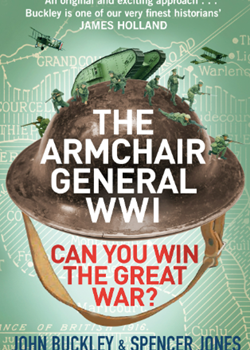The Armchair General World War One – Can You Win the Great War? by John Buckley and Spencer Jones
- Home
- World War I Book Reviews
- The Armchair General World War One – Can You Win the Great War? by John Buckley and Spencer Jones

(Century, 2023) £10, HB, 423 pages
ISBN 978-1-529901-016
An eye-catching front cover. A publication date at the end of October. A book dealing with ‘what ifs?’ or so-called counterfactual history. Surely this is a book aimed at the ‘gifting’ market and not serious military history. However, as the adage goes, ‘don’t judge a book by its cover.’
Firstly, The Armchair General WW1 is written by two noted academics, one of whom, Dr Spencer Jones, is well known to WFA members. Secondly, and as the authors explain in the introduction, simulations or war-gaming are an accepted teaching strategy in academia for ‘exploring the role of crucial pivotal decisions in military and strategic history, the effect of a commander’s choices and the enduring fascination with the impact of alternative outcomes’.
In the book several events from the Great War, some well-known: the July Crisis, Gallipoli, the Battle of the Somme; and some less well known: Lawrence of Arabia, the Zimmerman Telegram – are presented as discrete chapters. In each chapter the reader is presented with a factual introduction of the given scenario and then invited to make a series of ‘decisions’. Each chapter concludes with a ‘Historical Note’, a summary of the historical outcome.
As an example, and in one of the chapters that lends itself successfully to the counterfactual approach, the reader is invited to stand in the boots of General Sir Henry Rawlinson and select either Rawlinson’s original ‘bite and hold’ strategy for the first day of the Somme campaign or adopt Haig’s broader vision of assaulting the German first and second lines on the same day. Depending on your decision, the reader is directed to different sections of the chapter where the differing narratives are played out.
The authors state ‘they have presented the counterfactual alternatives as much as possible as ‘real historical accounts’ and the counterfactuals posited in each chapter are certainly credible. Their authority is assisted by the effective use of contemporary documents and photographs. Moreover, the supporting maps and diagrams are of a high standard and further enhance the text.
To take the chapter on the July Crisis as an example, it is just not possible to deal properly with a scenario this complex in 60 or so pages. However, a further reading list is provided for each chapter, although the list for the July Crisis could usefully be expanded to include the Russian perspective (Sean McMeekin’s July 1914) and from a Balkan standpoint (Paul Miller-Melamed’s Misfire).
It is not immediately obvious where The Armchair General sits in the historiography of the Great War. It might be easy to dismiss counterfactual history as a less than serious historical discipline, although Niall Ferguson believed it worthy of his attention in Virtual History published in 1997. However, by creating largely plausible alternative narratives the authors avoid that charge. On the other hand, each chapter can be used as a jumping off point for further study. Indeed, this reviewer’s interest was piqued by the chapter about the Zimmerman Telegram into reading Thomas Boghardt’s book of the same name.
Review by Stephen Manning
[This review first appeared in the March 2024 edition of Stand To!]





